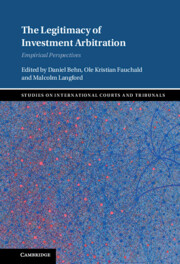Book contents
- The Legitimacy of Investment Arbitration
- Studies on International Courts and Tribunals
- The Legitimacy of Investment Arbitration
- Copyright page
- Contents
- Figures
- Tables
- Contributors
- 1 Introduction: The Legitimacy Crisis and the Empirical Turn
- 2 The International Investment Regime and Its Discontents
- Part I Process Legitimacy
- Part II Process Legitimacy
- Part III Output Legitimacy
- 10 The West and the Rest: Geographic Diversity and the Role of Arbitrator Nationality in Investment Arbitration
- 11 Mixing Methodologies in Empirically Investigating Investment Arbitration and Inbound Foreign Investment
- 12 Double Jeopardy? The Use of Investment Arbitration in Times of Crisis
- 13 Who Has Benefited Financially from Investment Treaty Arbitration? An Evaluation of the Size and Wealth of Claimants
- 14 Explaining China’s Relative Absence from Investment Treaty Arbitration
- Part IV Legitimation Strategies
- Index
10 - The West and the Rest: Geographic Diversity and the Role of Arbitrator Nationality in Investment Arbitration
from Part III - Output Legitimacy
Published online by Cambridge University Press: 06 January 2022
- The Legitimacy of Investment Arbitration
- Studies on International Courts and Tribunals
- The Legitimacy of Investment Arbitration
- Copyright page
- Contents
- Figures
- Tables
- Contributors
- 1 Introduction: The Legitimacy Crisis and the Empirical Turn
- 2 The International Investment Regime and Its Discontents
- Part I Process Legitimacy
- Part II Process Legitimacy
- Part III Output Legitimacy
- 10 The West and the Rest: Geographic Diversity and the Role of Arbitrator Nationality in Investment Arbitration
- 11 Mixing Methodologies in Empirically Investigating Investment Arbitration and Inbound Foreign Investment
- 12 Double Jeopardy? The Use of Investment Arbitration in Times of Crisis
- 13 Who Has Benefited Financially from Investment Treaty Arbitration? An Evaluation of the Size and Wealth of Claimants
- 14 Explaining China’s Relative Absence from Investment Treaty Arbitration
- Part IV Legitimation Strategies
- Index
Summary
The lack of geographic diversity among arbitrators is a common critique of investor–state dispute settlement. This has emerged as a major legitimacy problem as 80% of ISDS cases are against non-Western respondent states. In this chapter, the authors map the existing level of diversity with new methods (tracking both nationality and residence) and examine whether greater diversity would make a difference in outcomes. The descriptive statistics reveal that only a third of arbitral appointments have gone to non-Western individuals, and that this falls to 25% when residence is taken into account. However, the issue becomes more complicated when examining the effect on outcomes. The regression analysis indicates that the absence of geographic representativeness can favour Western home and host states, especially when the Chair is from the West. However, possibly due to a high degree of institutionalization and socialization of arbitrators in the system, it does not appear at present that arbitrator nationality has a significant effect on outcomes.
Keywords
- Type
- Chapter
- Information
- The Legitimacy of Investment ArbitrationEmpirical Perspectives, pp. 283 - 314Publisher: Cambridge University PressPrint publication year: 2022



